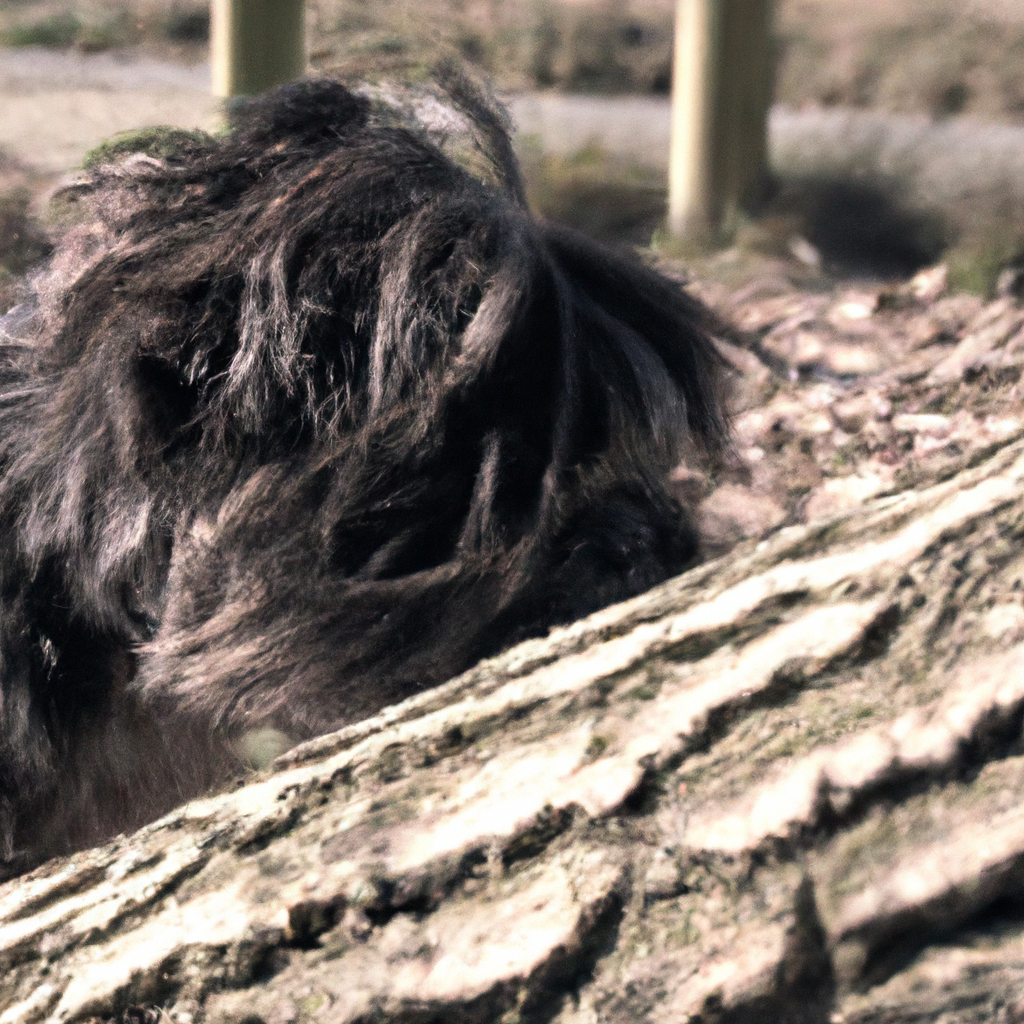The Affenpinscher, a small yet bold breed, is known for its distinctive bark. Unraveling the mysteries of an Affenpinscher’s bark involves understanding the breed’s history, behavior, and communication methods. This exploration delves into the unique characteristics of the Affenpinscher’s bark, its various meanings, and how it contributes to the dog’s overall charm and appeal.
Understanding the Unique Bark of an Affenpinscher
Unraveling the mysteries of an Affenpinscher’s bark is a fascinating journey into the world of this unique breed. Affenpinschers, also known as “Monkey Terriers” due to their distinct, monkey-like faces, are small but incredibly spirited dogs. Their barks, much like their personalities, are distinctive and full of character.
To truly understand the Affenpinscher’s bark, one must first appreciate the breed’s history. Originating from Germany in the 17th century, Affenpinschers were initially bred to be ratters, hunting and killing rats in homes and stables. This background has instilled in them a strong, fearless nature, which is often reflected in their assertive and sometimes surprisingly loud bark for such a small dog.
Affenpinschers are known for their alertness and protective nature, which is why their bark often serves as a warning signal. When they perceive a threat, whether it’s a stranger at the door or an unfamiliar sound, they won’t hesitate to sound the alarm. Their bark in such situations is typically sharp and persistent, a clear indication of their intent to protect their territory and their family.
However, an Affenpinscher’s bark isn’t just about sounding the alarm. It’s also a means of communication. Affenpinschers, like most dogs, use their bark to express a range of emotions and needs. A happy, excited bark often greets family members returning home, while a more plaintive, whining bark might indicate hunger or the need for a bathroom break.
Interestingly, Affenpinschers are also known to be quite vocal when they’re playing. Their playful bark is usually easy to distinguish from their warning bark. It’s generally more high-pitched and less persistent, often accompanied by wagging tails and bouncing movements. This is their way of inviting their human companions or fellow dogs to join in the fun.
Despite their small size, Affenpinschers have a surprisingly deep and resonant bark, which can sometimes be mistaken for that of a much larger dog. This is another testament to their fearless nature and their readiness to take on challenges much bigger than themselves.
However, it’s important to note that while Affenpinschers are naturally vocal, excessive or inappropriate barking can be a sign of underlying issues. It could indicate boredom, anxiety, or even health problems. Therefore, it’s crucial for Affenpinscher owners to pay attention to changes in their dog’s barking patterns and seek professional advice if necessary.
Understanding the unique bark of an Affenpinscher is about more than just deciphering the sounds they make. It’s about understanding their personality, their history, and their way of communicating with the world. It’s about appreciating the complexity and depth of this small but mighty breed.
So, the next time you hear an Affenpinscher’s bark, take a moment to listen. You might just be surprised at what you can learn from this small, spirited dog with the big, bold bark. After all, every bark tells a story, and the Affenpinscher’s bark is certainly one worth listening to.
Decoding the Affenpinscher’s Bark: What is Your Dog Trying to Tell You?
Unraveling the mysteries of an Affenpinscher’s bark can be a fascinating journey into the world of canine communication. Affenpinschers, also known as “Monkey Terriers,” are small but mighty dogs, known for their distinctive, often humorous, expressions and their lively, confident demeanor. But what about their bark? What is your Affenpinscher trying to tell you when they let out that distinctive sound?
Affenpinschers, like all dogs, use their barks as a primary means of communication. They bark to express a range of emotions and needs, from excitement and happiness to fear, anxiety, or a desire for attention. Understanding the nuances of your Affenpinscher’s bark can help you better meet their needs and strengthen your bond with your furry friend.
One of the first things to note about an Affenpinscher’s bark is its volume. These dogs have a surprisingly loud bark for their size, which can be startling if you’re not used to it. This loud bark is often a sign of excitement or alertness. If your Affenpinscher suddenly lets out a loud bark, they might be trying to tell you they’ve spotted something interesting or unusual, like a squirrel in the yard or a new toy.
On the other hand, a softer, more subdued bark can indicate a desire for attention or companionship. Affenpinschers are known for their sociable nature and they love spending time with their human family. If your Affenpinscher is barking softly while looking at you or following you around, they’re likely asking for some quality time together.
The frequency of your Affenpinscher’s bark can also provide clues about what they’re trying to communicate. A series of rapid, high-pitched barks often indicates excitement or playfulness. This is a common sound during playtime or when your Affenpinscher is eager for a walk or a treat. Conversely, a single, low-pitched bark can be a sign of fear or uncertainty. If your Affenpinscher lets out this kind of bark, they might be feeling uneasy about a new situation or person.
It’s also important to pay attention to the context in which your Affenpinscher is barking. Are they barking at the doorbell, a passing car, or seemingly at nothing at all? Understanding the triggers for your Affenpinscher’s bark can help you address any potential issues, such as anxiety or over-excitement.
Remember, while barking is a natural form of communication for dogs, excessive or disruptive barking can be a sign of underlying issues, such as boredom, anxiety, or health problems. If your Affenpinscher’s barking seems out of character or is causing problems, it’s always a good idea to consult with a vet or a professional dog trainer.
Decoding the Affenpinscher’s bark is a fascinating exercise in canine communication. By paying attention to the volume, frequency, and context of your Affenpinscher’s bark, you can gain a deeper understanding of their needs, emotions, and the world from their perspective. So the next time your Affenpinscher lets out a bark, take a moment to listen. You might be surprised at what you learn.
The Affenpinscher’s Bark: A Language of Its Own
Unraveling the mysteries of an Affenpinscher’s bark is a fascinating journey into the world of canine communication. The Affenpinscher, a small but mighty breed, is known for its distinctive bark, which is as unique as the dog itself. This bark, often described as a mix of a growl and a howl, is not just a random noise but a language of its own, filled with nuances and subtleties that convey a wide range of emotions and messages.
To the untrained ear, an Affenpinscher’s bark might sound like any other dog’s bark. However, upon closer inspection, you’ll find that it’s a complex form of communication. The Affenpinscher uses its bark to express everything from joy and excitement to fear and aggression. It’s a way for the dog to communicate with its human companions, as well as with other dogs and animals.
One of the most common reasons an Affenpinscher barks is to alert its family to potential danger. This breed is known for its protective nature, and its bark serves as a warning signal. If an Affenpinscher senses a threat, it will let out a loud, sharp bark to alert its family. This is a clear example of how the Affenpinscher uses its bark as a tool for communication.
On the flip side, an Affenpinscher’s bark can also be a sign of happiness and excitement. When an Affenpinscher is playing or is excited to see its owner, it will often let out a series of short, high-pitched barks. This is the dog’s way of expressing its joy and enthusiasm. It’s a delightful sound that Affenpinscher owners know and love.
However, an Affenpinscher’s bark can also indicate stress or discomfort. If an Affenpinscher is feeling anxious or is in pain, it might let out a low, continuous growl. This is the dog’s way of communicating that something is wrong. It’s a signal that should not be ignored, as it could indicate a serious health issue.
Understanding an Affenpinscher’s bark is not just about deciphering the different sounds it makes. It’s also about paying attention to the dog’s body language. The way an Affenpinscher moves and behaves can provide valuable clues about what it’s trying to communicate. For example, if an Affenpinscher is barking while its tail is wagging and its body is relaxed, it’s likely expressing happiness or excitement. But if the dog is barking while its body is stiff and its tail is tucked between its legs, it could be a sign of fear or aggression.
In conclusion, an Affenpinscher’s bark is a rich and complex form of communication. It’s a language of its own, filled with a wide range of sounds that convey different emotions and messages. By taking the time to understand this language, you can deepen your bond with your Affenpinscher and better meet its needs. So the next time your Affenpinscher barks, don’t just hear it as noise. Listen to it as a form of communication, and try to understand what your furry friend is trying to tell you.
The Science Behind an Affenpinscher’s Bark

Unraveling the mysteries of an Affenpinscher’s bark is a fascinating journey into the world of canine communication. Affenpinschers, also known as “Monkey Terriers” due to their primate-like faces, are small but mighty dogs with a distinctive bark that is as unique as their appearance. But what is the science behind an Affenpinscher’s bark? Let’s delve into this intriguing topic.
Firstly, it’s important to understand that a dog’s bark is not just a random sound. It’s a complex form of communication that conveys a wide range of emotions and intentions. When an Affenpinscher barks, it’s trying to tell you something. It could be expressing excitement, fear, or even boredom. The key to understanding an Affenpinscher’s bark lies in paying attention to the context, frequency, and tone of the bark.
The science behind an Affenpinscher’s bark is rooted in the dog’s vocal cords and the way they are used. Like humans, dogs have a larynx, or voice box, that contains vocal cords. When air passes through the vocal cords, they vibrate, producing sound. The pitch and volume of a dog’s bark are determined by the size and shape of the vocal cords and the way the dog manipulates them. Affenpinschers, being small dogs, have smaller vocal cords, which results in a higher-pitched bark.
However, the pitch of an Affenpinscher’s bark is not the only thing that sets it apart. Affenpinschers are known for their spirited and fearless nature, traits that are often reflected in their bark. They tend to bark with a lot of energy and enthusiasm, which can make their bark sound louder and more intense than it actually is. This is a classic example of how a dog’s personality can influence its bark.
Another interesting aspect of an Affenpinscher’s bark is its variability. Affenpinschers are known for their wide range of vocalizations, which include not just barks, but also growls, whines, and even howls. This variability is thought to be a result of the breed’s history as a ratter and watchdog. In the past, Affenpinschers had to use their voices to alert their owners to the presence of rats and other pests, and this required a wide range of sounds.
In conclusion, the science behind an Affenpinscher’s bark is a fascinating blend of anatomy, personality, and history. By understanding the factors that shape an Affenpinscher’s bark, we can gain a deeper appreciation for these unique and charming dogs. So the next time you hear an Affenpinscher bark, remember that it’s not just a noise. It’s a complex form of communication that carries a wealth of information about the dog’s emotions, intentions, and even its past. And that’s what makes unraveling the mysteries of an Affenpinscher’s bark such a fascinating endeavor.
The Affenpinscher’s Bark: A Key to Their Personality
Unraveling the mysteries of an Affenpinscher’s bark is a fascinating journey into the heart of this unique breed’s personality. Affenpinschers, also known as “Monkey Terriers” due to their distinct, primate-like faces, are small but mighty dogs with a bark that is as distinctive as their appearance.
The Affenpinscher’s bark is not just a sound; it’s a language that communicates a wealth of information about their mood, needs, and even their health. It’s a key to understanding their personality, and once you learn to interpret it, you’ll gain a deeper appreciation for these charming little dogs.
Affenpinschers are known for their bold and adventurous spirit, and their bark often reflects this. They have a surprisingly loud and robust bark for such a small dog, a testament to their fearless nature. When an Affenpinscher barks, it’s often because they’re alerting you to something they perceive as a threat. They’re excellent watchdogs, and their bark serves as a warning to potential intruders. However, it’s important to remember that what an Affenpinscher perceives as a threat could be as innocuous as a squirrel in the yard or a knock at the door.
On the other hand, an Affenpinscher’s bark can also be a sign of excitement or playfulness. These dogs are known for their lively and mischievous personalities, and they love to play. A series of short, rapid barks often means that your Affenpinscher is in a playful mood and ready for some fun.
However, it’s not all about alertness and play. An Affenpinscher’s bark can also indicate discomfort or distress. A high-pitched, continuous bark could mean that your dog is in pain or feeling anxious. If your Affenpinscher’s bark changes suddenly or they’re barking more than usual, it’s a good idea to consult with a vet to rule out any health issues.
Understanding the nuances of an Affenpinscher’s bark can take time, but it’s a rewarding process. It’s like learning a new language, one that brings you closer to your furry friend. Paying attention to the pitch, frequency, and context of your Affenpinscher’s bark can provide valuable insights into their emotional state and needs.
It’s also worth noting that while Affenpinschers are generally a vocal breed, each dog is an individual with its own personality. Some Affenpinschers may be more vocal than others, and the reasons for their barking can vary. Training and socialization from a young age can help manage excessive barking and ensure that your Affenpinscher’s bark is used as a form of effective communication rather than a nuisance.
In conclusion, the Affenpinscher’s bark is a multifaceted tool for communication that reflects their bold, playful, and sometimes mischievous personality. By learning to understand and interpret their unique language, you can strengthen your bond with your Affenpinscher and ensure that their needs are being met. So next time your Affenpinscher barks, listen closely. They’re trying to tell you something, and it’s our job as their companions to understand what that is.
Interpreting the Different Barks of an Affenpinscher
Unraveling the mysteries of an Affenpinscher’s bark can be a fascinating journey. These small, scruffy dogs, often referred to as “monkey dogs” due to their primate-like faces, are known for their lively personalities and expressive vocalizations. Understanding the different barks of an Affenpinscher can help you better communicate with your furry friend and respond to their needs more effectively.
Firstly, it’s important to note that an Affenpinscher’s bark is not just noise. It’s a form of communication, a way for your dog to express their feelings, needs, and reactions to the world around them. Just as humans use different tones and volumes to convey different emotions, so do Affenpinschers.
One of the most common barks you’ll hear from an Affenpinscher is the alert bark. This is a sharp, loud bark that your dog will use to let you know that something has caught their attention. It could be a stranger at the door, a squirrel in the yard, or a new sound that they’re not familiar with. This bark is their way of saying, “Hey, something’s happening and I think you should know about it!”
Then there’s the playful bark. This is a lighter, more rhythmic bark that you’ll often hear when your Affenpinscher is engaged in play. It’s their way of expressing joy and excitement. If you hear this bark, it’s a good sign that your dog is happy and enjoying themselves.
On the other hand, a low, continuous growl or bark can be a sign of fear or discomfort. If your Affenpinscher is barking in this way, it’s important to identify what’s causing their distress and try to alleviate it. It could be a loud noise, a new person or animal, or a situation they’re not comfortable with.
Another type of bark you might hear from an Affenpinscher is the demand bark. This is a persistent, often high-pitched bark that your dog will use when they want something. It could be that they’re hungry, they want to go outside, or they want your attention. While it can be tempting to give in to this bark to quiet your dog, it’s important not to reinforce this behavior. Instead, try to teach your dog other ways to communicate their needs.
Finally, there’s the lonely bark. This is a long, mournful howl that your Affenpinscher might use when they’re feeling lonely or anxious. If you hear this bark, it’s a sign that your dog is missing you and needs some company.
In conclusion, understanding the different barks of an Affenpinscher can help you build a stronger bond with your dog. By paying attention to their vocalizations, you can better understand their needs and emotions, and respond in a way that makes them feel loved and understood. So next time your Affenpinscher barks, don’t just hear it as noise. Listen to it as a form of communication, a way for your dog to express themselves and connect with you.
The Affenpinscher’s Bark: More Than Just Noise
Unraveling the mysteries of an Affenpinscher’s bark is a fascinating journey into the world of canine communication. The Affenpinscher, a small but mighty breed, is known for its distinctive bark, which is more than just noise. It’s a complex language that conveys a wealth of information about the dog’s mood, needs, and perceptions of its environment.
The Affenpinscher’s bark is a unique blend of high-pitched yips and deeper growls. This breed is known for its vocal expressiveness, and its bark can range from a soft whimper to a loud, assertive bark. The key to understanding an Affenpinscher’s bark lies in paying attention to the context, the dog’s body language, and the specific sounds it makes.
When an Affenpinscher barks, it’s often trying to communicate something important. For instance, a series of short, sharp barks usually indicates excitement or anticipation. This could be a response to seeing a favorite toy, the arrival of a beloved family member, or the prospect of a walk or meal. On the other hand, a low, continuous growl is typically a warning sign. The dog might be feeling threatened or anxious, or it could be guarding its territory or possessions.
Affenpinschers are also known to use their bark to express their needs. A persistent, repetitive bark could mean that the dog is hungry, thirsty, or needs to go outside. It could also be a sign of boredom or loneliness. Affenpinschers are social animals that thrive on interaction and stimulation, so a bored or lonely Affenpinscher might resort to barking to get attention.
However, it’s important to remember that not all barking is communication. Sometimes, an Affenpinscher might bark simply because it enjoys the sound of its own voice. This breed is known for its playful, mischievous nature, and its bark is often a reflection of its lively personality.
Understanding an Affenpinscher’s bark is not just about decoding the sounds it makes. It’s also about understanding the dog’s body language. For instance, an Affenpinscher that’s barking with its tail wagging and body relaxed is likely expressing joy or excitement. But an Affenpinscher that’s barking with its body stiff, ears flattened, and tail tucked under is likely feeling scared or threatened.
In conclusion, the Affenpinscher’s bark is a rich, nuanced language that reflects the dog’s emotional state, needs, and perceptions of its environment. By paying attention to the context, the specific sounds, and the dog’s body language, owners can gain a deeper understanding of their Affenpinscher’s bark and respond more effectively to its needs. So the next time your Affenpinscher barks, don’t just hear it as noise. Listen to it as a form of communication, and you’ll be one step closer to unraveling the mysteries of your Affenpinscher’s bark.
The Art of Communicating with an Affenpinscher Through Their Bark
Unraveling the mysteries of an Affenpinscher’s bark is a fascinating journey into the world of canine communication. Affenpinschers, also known as “Monkey Terriers,” are small but mighty dogs, known for their distinctive, often humorous, expressions and their lively, confident demeanor. But what about their bark? What does it mean, and how can we, as their human companions, understand and respond to it?
Firstly, it’s important to understand that an Affenpinscher’s bark is not just noise. It’s a form of communication, a way for these little dogs to express their feelings, needs, and reactions to the world around them. Just as humans use different tones and volumes of voice to convey different emotions, so do Affenpinschers. A high-pitched, rapid bark might indicate excitement or anxiety, while a low, slow bark could be a sign of contentment or relaxation.
One of the most common reasons an Affenpinscher barks is to alert their family to something unusual or potentially threatening. This breed is known for its protective nature, and they take their role as a watchdog very seriously. If your Affenpinscher suddenly starts barking, it’s worth checking out what has caught their attention. It could be a stranger at the door, a squirrel in the yard, or even a strange noise that you can’t hear.
Another reason for an Affenpinscher’s bark could be a call for attention. These dogs are sociable and love being the center of attention. If they feel ignored or bored, they might bark to get your attention. This is their way of saying, “Hey, I’m here! Let’s play!” It’s important to respond to this type of bark appropriately. Ignoring it could lead to more persistent barking, while rewarding it with attention could encourage the behavior. Instead, try to find a balance by providing your Affenpinscher with plenty of mental and physical stimulation throughout the day.
Affenpinschers may also bark when they’re feeling anxious or stressed. This could be due to a change in their environment, such as a move to a new home, or a change in their routine, like a new family member or pet. In these cases, the bark is a sign of their discomfort and a plea for reassurance. Providing a calm, stable environment and plenty of positive reinforcement can help alleviate their anxiety.
Finally, it’s worth noting that some Affenpinschers are just more vocal than others. This can be influenced by their individual personality, their upbringing, and even their genetics. If your Affenpinscher is a frequent barker, it’s important to understand why they’re barking and address any underlying issues. Training can also be beneficial in teaching them when it’s appropriate to bark and when it’s not.
In conclusion, an Affenpinscher’s bark is a complex form of communication, filled with nuances and subtleties. By paying attention to the context, tone, and frequency of their barks, we can gain a deeper understanding of what our furry friends are trying to tell us. And in doing so, we can strengthen our bond with them and ensure their needs are being met. After all, isn’t that what being a good pet parent is all about?After extensive study, it can be concluded that the bark of an Affenpinscher is unique and serves various purposes such as alerting their owners of potential danger, expressing their emotions, or simply seeking attention. Their bark can be a reflection of their energetic and fearless personality. Understanding the nuances of an Affenpinscher’s bark can significantly improve communication between the dog and its owner.





